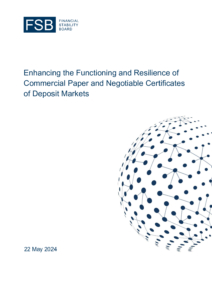Press enquiries:
+41 61 280 8477
[email protected]
Ref: 11/2024
- FSB analysis finds that commercial paper (CP) and negotiable certificates of deposit (CD) markets generally function well in normal times but are susceptible to illiquidity in times of stress.
- Potential reforms to enhance the functioning and resilience of CP and CD markets include improving market microstructure; enhancing reporting and transparency; and expanding private repo markets for CP and CD collateral.
- The idiosyncratic nature of CP and CD markets means that not all potential reforms may be appropriate or relevant for all jurisdictions.
The Financial Stability Board (FSB) published today a report analysing the functioning of, and considering potential ways to address vulnerabilities in, CP and negotiable CD markets.
The report identifies a number of vulnerabilities in CP and CD markets, including limited secondary market activity due to the buy-and-hold nature of these instruments, investor and dealer concentration, and opacity. Dealers’ activity and revenues are concentrated in primary markets and while dealers may increase intermediation in times of stress, this has proven insufficient to meet spikes in liquidity demand. The high interconnectedness of CP and CD markets with other funding markets means that stress can be transmitted within the financial system and across borders, as experienced during the March 2020 market turmoil.
The report notes that moves towards electronification of trading platforms have gained little traction over recent years and, where platforms are used, they primarily facilitate primary market CP and CD issuance. Industry-led initiatives have been limited in scale and impact so far, in part due to relatively low margins in this market. The significant diversity of CP and CD markets across jurisdictions presents a challenge for formulating a uniform policy response.
The report examines potential market reforms by industry and public authorities to improve the functioning and potentially the resilience of CP and CD markets. They include changes in market microstructure; increased transparency (regulatory reporting and public disclosure); and increasing liquidity through private repo markets. While these reforms may have a positive impact for market functioning in normal times – particularly if used in combination and appropriately tailored to each jurisdiction – they would likely not, on their own, significantly enhance the resilience of CP and CD markets. Authorities are encouraged to explore the usefulness of these reforms for their own markets and to consider how these could complement other policies, such as addressing vulnerabilities in money market funds (MMFs).
Notes to editors
This work forms part of the FSB’s work programme on enhancing the resilience of NBFI. It follows up on the 2021 FSB report with policy proposals to enhance MMF resilience, which noted that policies to enhance the resilience of MMFs could be accompanied by measures to improve the functioning of the underlying short-term funding markets. Further details on the FSB’s work programme to enhance resilience in NBFI can be found in its latest progress report.
The FSB coordinates at the international level the work of national financial authorities and international standard-setting bodies and develops and promotes the implementation of effective regulatory, supervisory, and other financial sector policies in the interest of financial stability. It brings together national authorities responsible for financial stability in 24 countries and jurisdictions, international financial institutions, sector-specific international groupings of regulators and supervisors, and committees of central bank experts. The FSB also conducts outreach with approximately 70 other jurisdictions through its six Regional Consultative Groups.
The FSB is chaired by Klaas Knot, President of De Nederlandsche Bank. The FSB Secretariat is located in Basel, Switzerland and hosted by the Bank for International Settlements.
For further information on the FSB, visit the FSB website, www.fsb.org.
